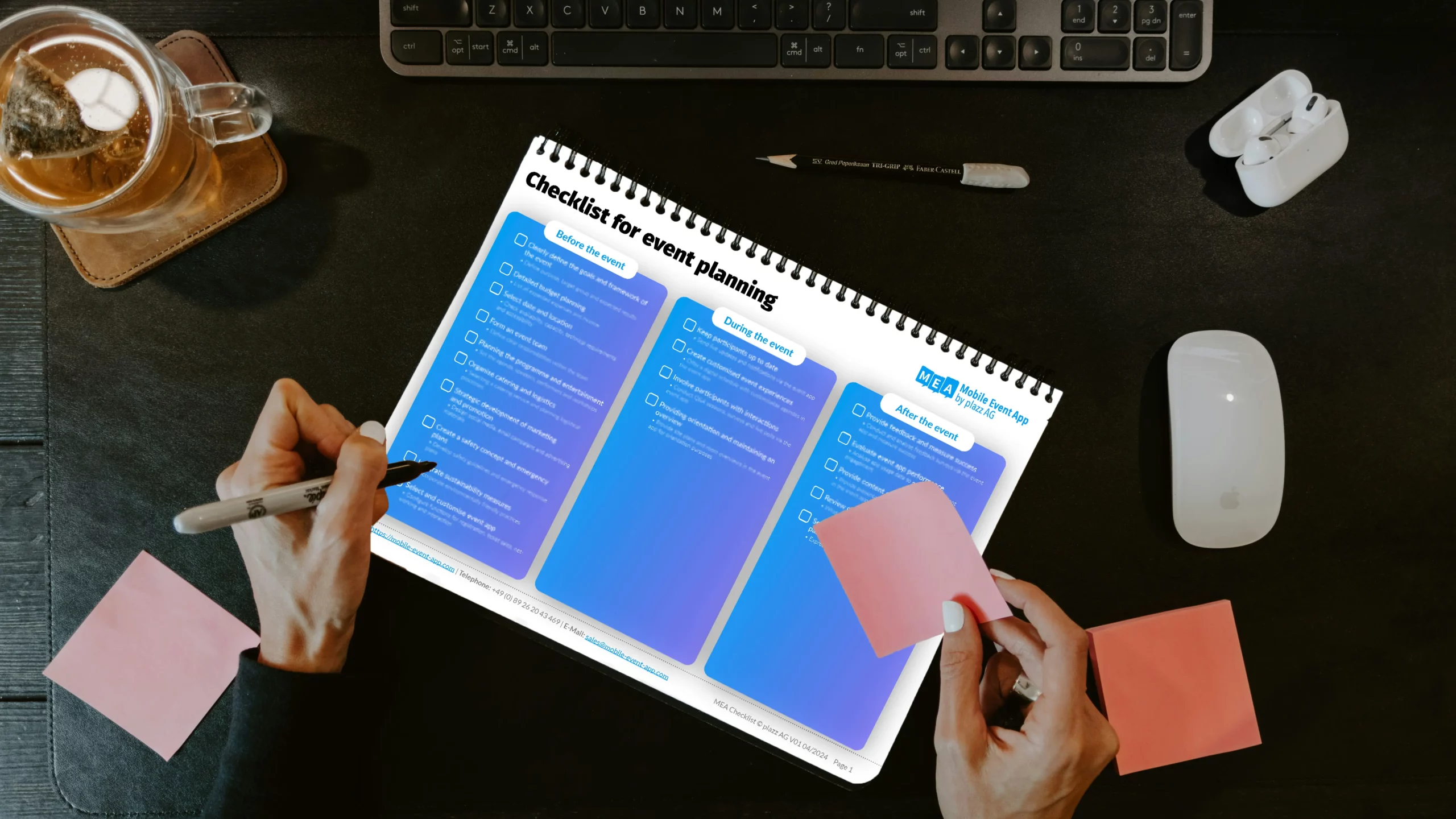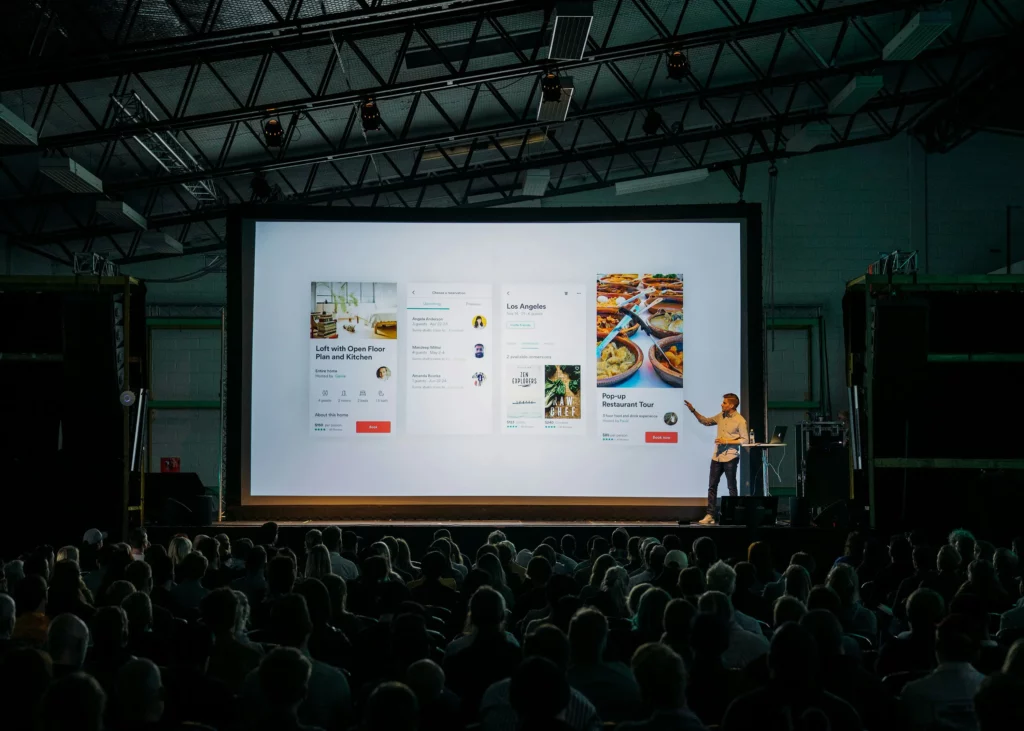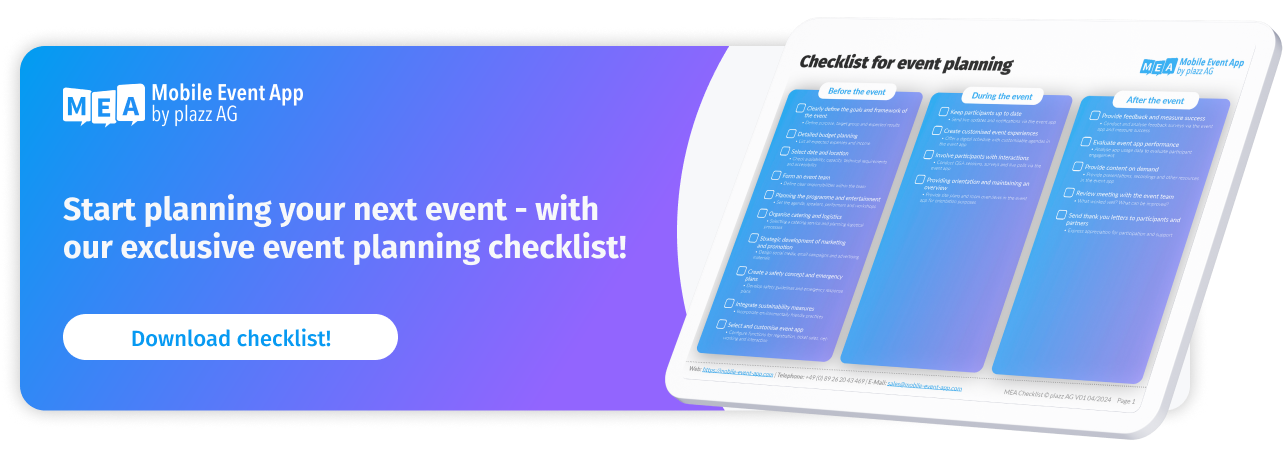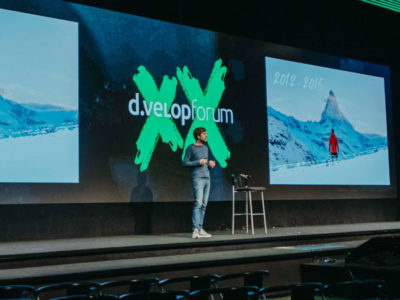
Event planning made easy: the perfect event with this checklist
Planning and organising events is a unique opportunity to bring people together, whether to celebrate, educate, foster business relationships or share ideas. The importance of events extends far beyond the moment of the event; they can leave lasting impressions, shape brand perceptions and build strong communities. However, event planning comes with its own challenges. It requires precise coordination of numerous components – from selecting a location that not only meets the technical requirements but also supports the atmosphere of the event, to ensuring that the catering exceeds attendees’ expectations, to developing a marketing plan that ensures the event reaches the right people.
Event planners must also be able to combine digital and physical experiences, as digital technologies and social media play an increasingly important role. The use of digital tools for event promotion, attendee engagement or measuring success is now essential. However, with these opportunities come additional responsibilities, such as ensuring data security and protecting the privacy of attendees. Furthermore, the increasing demand for sustainable events requires event planners to find innovative solutions to minimise their ecological footprint. The complexity of event planning is therefore constantly growing, which requires a comprehensive understanding of the industry, a high degree of flexibility and a willingness to constantly evolve.
For structured support with this complex task, we invite you to download our white paper “Checklist for event planning”. It provides practical guidelines and a detailed checklist that covers all the essential steps and helps you to successfully combine the digital and physical aspects of your event. With this guide, you can be sure that your event will not only meet current requirements, but also have a lasting impact.
How clear event objectives lay the foundation for success
Defining clear objectives before the start of event planning creates the framework for the entire event concept. These objectives not only act as a guide for strategic direction, but also as a basis for evaluating success once the event has been completed. By defining specific, measurable, achievable, relevant and time-bound (SMART) objectives, organisers can establish a solid basis for decision-making. These objectives determine which target group should be addressed, which messages should be conveyed and what type of interaction should be encouraged. They influence the choice of venue, the way in which the event is promoted and the criteria for the selection of content and speakers.

A clear understanding of event objectives also allows planners to effectively measure ROI (return on investment). Whether the goal is to generate leads for a company, raise funds or increase brand loyalty, each objective requires specific success criteria. By defining these objectives, event organisers can target their strategies, allocate resources efficiently and ultimately create an event that not only provides value to attendees, but also supports the overall goals of the company or brand. In short, carefully defining event objectives lays the foundation for success by providing clear direction and enabling the measurement of progress and results.
Importance of target group analysis for a customised event experience
Target group analysis plays a crucial role in creating an event that not only attracts attention but is also memorable. By deeply understanding the target audience – their wants, needs, challenges and expectations – event planners can fine-tune every detail of the event to achieve a high response and attendee satisfaction. This analysis makes it possible to create personalised experiences that are precisely tailored to the interests of the participants, be it through topic-specific workshops, interactive panels or networking opportunities that are specifically tailored to the needs of the target group.
Furthermore, a detailed target group analysis enables more effective communication and promotion of the event. By understanding which channels best reach the target audience and what messages appeal to them, marketing strategies can be developed to increase registration rates and encourage wider participation. In addition, the analysis can shed light on what challenges or barriers might prevent potential participants from attending the event so that solutions can be proactively developed to overcome these barriers.

By putting audience analysis at the centre of their planning processes, event planners can ensure that every element of the event – from the initial announcement to the final follow-up – is designed to create an engaging, relevant and memorable experience. This not only drives immediate attendee engagement during the event, but also helps build brand loyalty and an engaged community in the long term. In today’s experience-driven world, this kind of targeted and participant-centred event design is the key to success.
Creation and management of an effective event budget
Budgeting requires careful planning and monitoring to avoid financial surprises and ensure the success of the event. An effective event budget starts with a detailed list of all expected income and expenses. This includes items such as venue hire, catering, technical equipment, marketing, staff and, if relevant, the cost of developing and operating an event app. To ensure realistic budgeting, it is advisable to obtain quotes from various providers and plan a financial buffer for unforeseen expenses. This buffer should be around 10-20% of the total budget. Another important tip is to continuously monitor the budget throughout the planning and implementation phase. This makes it possible to recognise deviations at an early stage and take appropriate countermeasures. The use of budgeting software or tools can help to categorise expenditure, maintain an overview and create financial reports. Last but not least, renegotiating contracts and looking for sponsorship or partnership opportunities is an effective way to reduce costs and generate additional revenue streams. Careful planning and active budget management are essential to minimise financial risks and maximise the success of the event.

Criteria for choosing the perfect venue
The choice of location has a significant influence on the participant experience. A perfect venue should not only fulfil the technical requirements and capacity for the expected number of participants, but should also match the atmosphere and theme of the event. Important criteria in the selection process include accessibility and transport links, available parking, flexibility of the space, technical equipment and catering options. Aspects such as accessibility, the availability of on-site support staff and costs also play a key role. Careful consideration of these factors will ensure that the venue not only fulfils practical requirements, but also helps to create a welcoming and stimulating environment that supports the event objectives and inspires attendees.
When taking a broader view, event planners should also consider the ambience and character of the location, as this has a significant impact on the mood of the event. A location that tells a story or has a unique charm can make the event experience even more memorable for participants. It is also important to book early to ensure that the desired location is available and to be able to plan any necessary adjustments or renovations in good time. Assessing reviews and obtaining feedback from previous organisers who have used the same venue can provide additional insight into the suitability and service of the location. Ultimately, careful venue selection and evaluation is a critical process that contributes significantly to the success of an event and creates an atmosphere that positively influences attendee retention and the overall experience.

Strategies for promoting the event and engaging the target group
Marketing and promotion increase the visibility of an event and effectively engage the target group. A successful marketing strategy combines traditional and digital channels to reach a wide range of potential attendees. These include social media, email marketing, content marketing through blog posts or videos, as well as billboard advertising or radio and television adverts where appropriate. Utilising social media platforms allows you to interact with your target audience in real time, share event updates and increase reach through hashtags and influencer marketing. Personalised email campaigns can help re-engage previous attendees and pique the curiosity of new prospects. It’s important to deliver a clear and engaging message that emphasises the unique value of the event and clearly communicates the benefits of attending.

A broader view of marketing strategies also includes partnerships with other brands or influencers that can expand the target audience and build trust in the event. In addition, early bird tickets or group discounts are effective incentives to encourage early bookings and secure an initial attendee base. Analysing data and feedback from previous events can also help to refine marketing efforts and develop more targeted campaigns. By combining different channels and techniques, organisers can develop a comprehensive promotional strategy that not only generates awareness, but also builds a deep connection with the target audience and encourages sustained engagement.
Digital tools for an enhanced event experience
The use of digital technologies has revolutionised the way events are planned, executed and experienced. Social media platforms, event apps and other digital tools offer extensive opportunities to enrich the attendee experience and encourage interaction. Social networks allow organisers to promote their event, engage with the target audience and build a sense of community by sharing teasers, content and live updates. Event apps, in turn, provide a platform for agenda management, networking opportunities, interactive elements such as polls or Q&A sessions and can serve as a one-stop-shop for all event information. They enable a personalised experience by allowing attendees to create their own schedules, network with other attendees and gain access to exclusive content.
We at plazz AG are providers of the Mobile Event App and have specialised in providing such digital event solutions. Our platform enables event organisers to create customised event apps that are tailored to the specific needs of their event. With features such as custom branding, live streaming, feedback tools and gamification elements, we help organisers create interactive and engaging event experiences. These digital solutions not only facilitate logistical planning and execution, but also increase attendee engagement and satisfaction by providing a platform for real-time interaction, learning and networking. The integration of digital technologies into event management is therefore an indispensable part of modern event planning, enabling traditional boundaries to be overcome and opening up a new dimension of attendee experience.

Ideas for designing an appealing and interactive event programme
Programme planning and entertainment create an engaging and interactive event experience. A well-thought-out selection of programme items and entertainment offerings can significantly increase guest participation and engagement. Innovative ideas such as interactive workshops, panels with Q&A sessions, live performances and technology-based experiences such as VR (virtual reality) stations or AR (augmented reality) games help to pique attendees’ interest and get them actively involved. In addition, networking sessions supported by special apps or platforms can promote dialogue and networking among participants. To add a more personal touch, customised experiences can be offered that are tailored to the interests and preferences of the target group. By integrating gamification elements, such as point systems for participation in various activities, organisers can create additional incentives that motivate active participation. A varied and interactive programme that combines both informative and entertaining elements ensures a balanced and enriching experience for all participants.
In the extended planning of the programme and entertainment, it is crucial to strike a balance between education, networking and entertainment. Involving industry leaders and opinion leaders as speakers or presenters can add weight and appeal to the programme. The choice of entertainment elements should support the overall atmosphere of the event and reinforce the message or objective of the event. By using feedback tools and interactive apps, organisers can also collect real-time feedback from participants and dynamically adapt the programme to the needs and wishes of the guests. Ultimately, a creative and participant-centric approach to programme planning and entertainment is the key to an unforgettable event that both inspires and actively engages participants.
Important considerations regarding catering and logistical organisation
A well thought out catering strategy that includes a variety of high quality food and beverages can greatly enhance the attendee experience. It is important to ensure a balanced selection that takes into account different dietary needs and preferences, including vegetarian, vegan and gluten-free options, to ensure that all guests are well catered for. In addition, logistical organisation plays a crucial role, from the smooth arrival and departure of participants to the efficient distribution of name badges and the timing of programme items. Clear signage and information about the event locations help to avoid confusion and simplify the process. The use of event management software can help to optimise these processes and ensure that everything runs smoothly. Effective communication with all parties involved, including caterers, technical teams and security personnel, is crucial to ensure that every aspect of the event is carefully planned and implemented. By considering these elements, organisers can create an all-encompassing experience that exceeds attendee expectations and promotes a positive and welcoming atmosphere.
With advanced planning of catering and logistics, it is also beneficial to consider sustainability aspects such as using local and seasonal produce or minimising waste through reusable crockery and cutlery options. Timely planning and coordination with service providers is also critical to avoid surprises or bottlenecks on the day of the event. Additionally, incorporating interactive elements, such as live cooking stations or themed bars, can enhance the catering experience and contribute to the overall experience. Careful planning and execution of the catering and logistics aspects reflect the professionalism and appreciation of the organisers for their guests, which is crucial for the long-term success and reputation of the event.
Planning security concepts and emergency plans
The planning of safety concepts and emergency plans ensures the well-being and safety of all participants. A comprehensive risk assessment should be carried out to identify potential hazards and take preventative measures. This includes ensuring sufficient numbers of security staff, implementing access controls and reviewing fire safety precautions. It is also important to clearly communicate safety procedures to attendees and staff, as well as training staff in first aid and emergency response. Emergency plans need to be prepared for a variety of scenarios, including medical emergencies, fire, natural disasters or threats from people. Establishing emergency exits and assembly points and planning for rapid evacuation are critical. There should also be close co-operation with local authorities and emergency services to ensure a rapid response in the event of an emergency. By carefully planning and implementing security measures and emergency plans, event organisers can create a safe environment that builds confidence among attendees and helps the event run smoothly.
When expanding these security measures, organisers should also consider modern technologies and digital solutions, such as the use of apps for real-time communication of security instructions or location tracking in emergencies. Regularly reviewing and updating security concepts and emergency plans is also essential in order to be able to react to new threats and changes in the event environment. A proactive approach to security planning helps to minimise risk and ensure a positive experience for all involved. Investing in security is an investment in the success of the event itself, as it lays the foundation for an undisturbed and enjoyable experience.
Implementation of ecologically sustainable practices in event planning
Integrating environmentally sustainable practices into event planning is not only a responsibility to the environment, but also an opportunity to send a positive signal to participants, partners and the public. Sustainable event planning includes minimising the environmental footprint through measures such as reducing waste, choosing eco-friendly materials, promoting public transport and using digital technologies to reduce paper consumption. Organisers can also support the local economy and reduce transport emissions by working with local suppliers and caterers who offer organic and seasonal products. Another important aspect is energy management, for example through the use of LED lighting and renewable energy sources. The event can also serve as a platform to raise awareness of ecological issues by offering workshops or information stands on sustainability topics.
The expansion of these practices requires careful planning and the commitment of all those involved. It is advisable to define sustainability goals early in the planning phase and establish clear guidelines for implementation. Measuring the environmental impact of the event, for example by calculating the carbon footprint, makes it possible to evaluate the success of sustainable measures and identify areas for future improvement. Communicating the efforts and successes in terms of sustainability can also strengthen the brand image and motivate participants to make a contribution themselves. Overall, implementing environmentally sustainable practices in event planning requires a holistic view and a willingness to question traditional approaches and seek innovative solutions that have a positive impact on the environment and society.
Methods for obtaining feedback and evaluating the success of the event
Obtaining feedback and measuring success assess the effectiveness and value of an event. Modern data collection methods, such as digital surveys and feedback apps, provide participants with a simple and accessible platform to share their impressions and experiences. These tools allow organisers to collect qualitative and quantitative data in a timely manner, providing insight into attendee satisfaction, content quality, format effectiveness and overall event atmosphere. In addition, social media and analytics tools can be used to measure engagement and interactions and gain additional insights. Measuring success also extends to analysing participant numbers, repeat rates, call-to-action conversion rates and the reach of event communications. By combining this data, organisers can build a comprehensive picture of event success and identify areas for improvement.
Systematically analysing the collected feedback makes it possible to make targeted adjustments for future events in order to continuously improve the participant experience. In addition, transparent communication about the results of the feedback analysis and the resulting changes can strengthen the trust and loyalty of participants. Implementing a continuous improvement process based on real data and attendee feedback is essential to increase the quality and relevance of events. Ultimately, feedback and success measurement help to maximise ROI (return on investment) and ensure that each event delivers real value for all participants.
Conclusion
Planning and organising a successful event is a complex task that requires careful preparation and attention to detail. From setting clear objectives to comprehensive target group analysis, creative programme design and efficient budgeting, every step is crucial to creating an unforgettable experience that excites attendees and achieves the goals set. The integration of digital technologies, particularly the use of an event app, plays an increasingly important role in enhancing the attendee experience and facilitating communication and interaction. Safety concepts and sustainability measures are also indispensable components of responsible event planning that ensures the well-being of guests and makes a positive contribution to environmental protection. Finally, systematically gathering feedback and carefully measuring success is essential in order to learn from each event and continuously improve future events.
For those looking for detailed guidance and support when planning their next event, the white paper “Event Planning Checklist” can be a valuable resource. This comprehensive document is available for download and offers practical tips and best practices that can help with event organisation. By using this white paper as a guide, event organisers can ensure that no important detail is overlooked and that their events are not only creative and well-organised, but also run smoothly and are remembered positively by attendees. Successful event planning therefore requires not only creative thinking and organisational skills, but also a deep understanding of the needs of the target group and the ability to react flexibly to changes.




